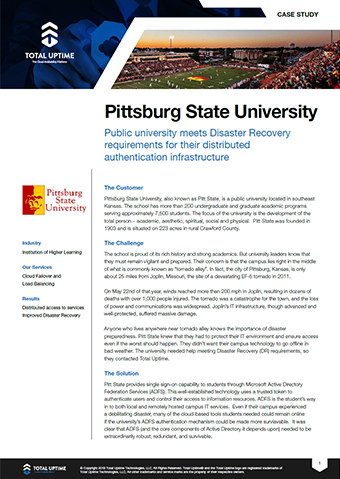Case study: Cloud Failover, Load Balancing
Public university meets Disaster Recovery requirements for their distributed authentication infrastructure.

Pittsburg State University, also known as Pitt State, is a public university located in southeast Kansas. The school has more than 200 undergraduate and graduate academic programs serving approximately 7,500 students. The focus of the university is the development of the total person – academic, aesthetic, spiritual, social and physical. Pitt State was founded in 1903 and is situated on 223 acres in rural Crawford County.
“We placed one ADFS server in Pittsburg, Kansas, and a second one at a sister university’s datacenter, Wichita State University, across the state. The two are connected via the Kansas Research and Education Network, but are capable of operating independently.”
– Timothy Pearson, Assistant Director, Office of Information Services
The Challenge
The school is proud of its rich history and strong academics. But university leaders know that they must remain vigilant and prepared. Their concern is that the campus lies right in the middle of what is commonly known as “tornado alley”. In fact, the city of Pittsburg, Kansas, is only about 25 miles from Joplin, Missouri, the site of a devastating EF-5 tornado in 2011.
On May 22nd of that year, winds reached more than 200 mph in Joplin, resulting in dozens of deaths with over 1,000 people injured. The tornado was a catastrophe for the town, and the loss of power and communications was widespread. Joplin’s IT infrastructure, though advanced and well-protected, suffered massive damage.
Anyone who lives anywhere near tornado alley knows the importance of disaster preparedness. Pitt State knew that they had to protect their IT environment and ensure access even if the worst should happen. They didn’t want their campus technology to go offline in bad weather. The university needed help meeting Disaster Recovery (DR) requirements, so they contacted Total Uptime.
The Solution
Pitt State provides single sign-on capability to students through Microsoft Active Directory Federation Services (ADFS). This well-established technology uses a trusted token to authenticate users and control their access to information resources. ADFS is the student’s way in to both local and remotely hosted campus IT services. Even if their campus experienced a debilitating disaster, many of the cloud-based tools students needed could remain online if the university’s ADFS authentication mechanism could be made more survivable. It was clear that ADFS (and the core components of Active Directory it depends upon) needed to be extraordinarily robust, redundant, and survivable.
Timothy Pearson, Assistant Director in Information Technology Services at Pitt State, called on Total Uptime to bolster ADFS in the event their main campus was no longer reachable.
To make this happen, PSU deployed redundant Active Directory and ADFS infrastructure at a sister Kansas university across the state and engaged Total Uptime help them set up a cloud failover solution using Total Uptime’s highly redundant global cloud platform. In addition to disaster failover capabilities, Total Uptime’s solution also serves as an ADFS load balancer. Geographically diverse ADFS servers combined with Total Uptime’s robust failover and load balancing solution was the distributed authentication infrastructure that the university was searching for. They can now process ADFS authentication requests even if the entire main campus is offline.
Timothy and his colleagues are very happy with the results, calling the Total Uptime approach “the best solution to fit our needs”. They know that their authentication infrastructure is now as survivable as anyone could make it. Asked what he liked about the Total Uptime solution, Timothy said that it was simple, straightforward, highly geographically distributed, and incredibly redundant — the right solution for the right price. What can Total Uptime do for your organization?